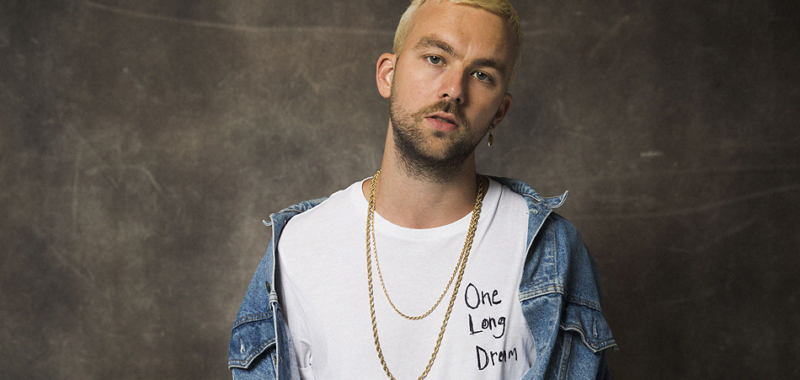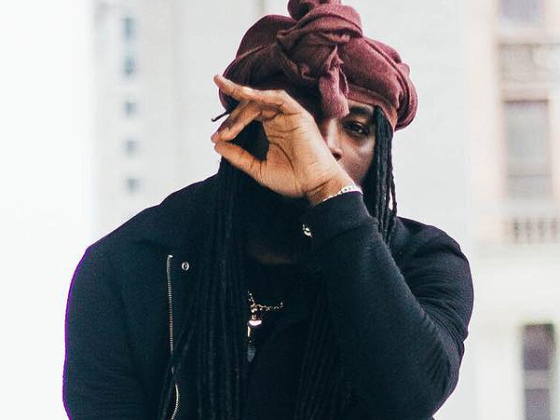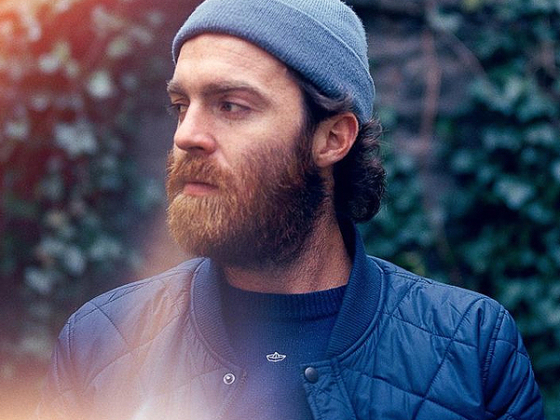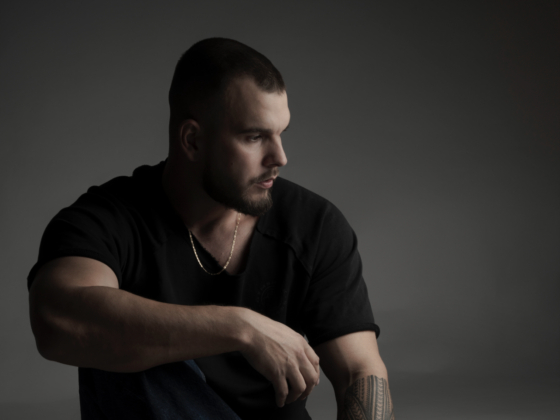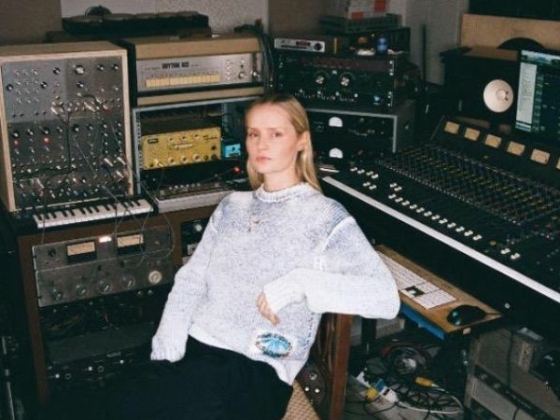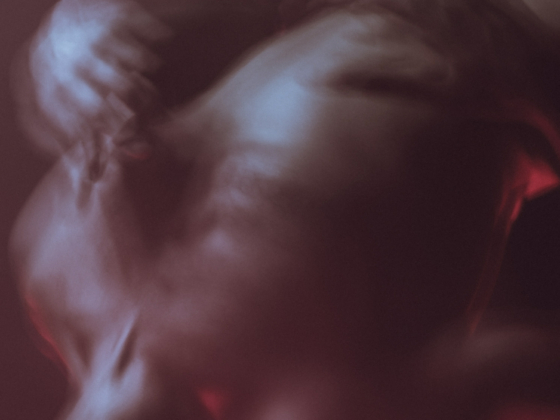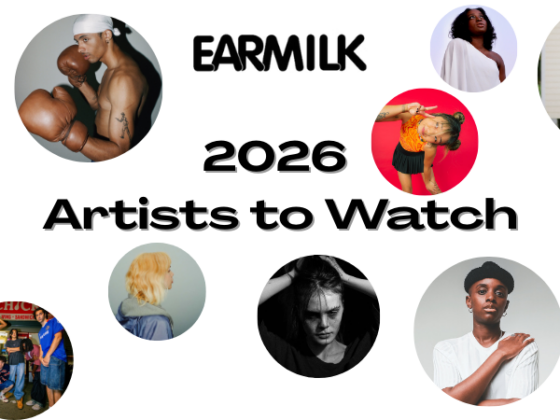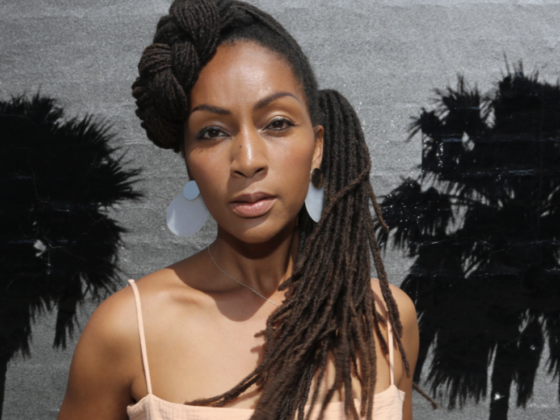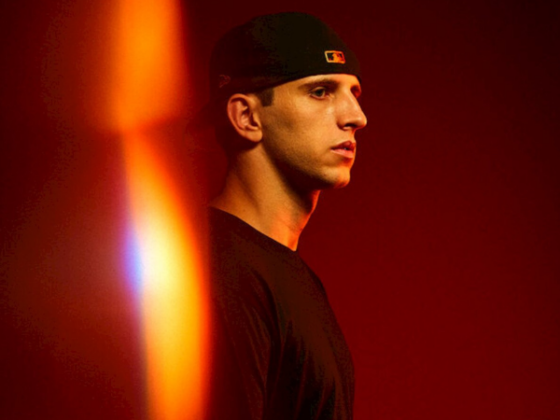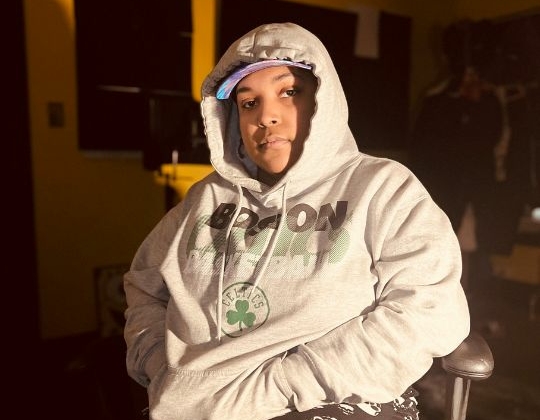Aaron Hoffman, better known by his stage name SonReal, is flying high. The Canadian born MC has just released his most personal project to date, One Long Dream, and is about to embark on a 23 city tour throughout North America.
Though things are going great for Hoffman now, that wasn’t always the case. On his road to success, he’s been dropped by his label, lost family members, and moved countries. Throughout all of this though, he’s remained focused, putting himself entirely into his music and letting the results speak for themselves. This is only the beginning for SonReal.
EARMILK caught up with the Canadian rhyme sayer at his apartment in LA to learn about how the album came together, his recording process, his upcoming tour and his perspective on the current state of the music industry.
EARMILK: Your album has been out for just under three weeks, talk to me about where your head is and how you're feeling.
SonReal: Man, you know what, it's like you hold on to your baby for so long, I've been working on the album for about two years now, so I think putting it out to the world has been the most refreshing feeling ever. Just watching it translate, watching people be excited about it, watching people be excited about these videos were about to drop off the album, is great. I think anytime you put a body of work that you're proud of; it's this refreshing, exhilarating feeling. I'm ready to get to work, though. I put that out, I put a bunch of new music, and people are excited, so now it's more inspiring for me to get to work. You know, seeing the reaction from it and having it out and being so excited about my team and me, we're just excited to keep it going, man, and work on the next album right away.
EM: For those of us who have never put out an album, tell me more. You say it's "refreshing," but it has to be nerve-wracking, putting yourself out there, right? Or are you used to that?
SR: No, this album I put myself out there way more, obviously. It's a way more personal album. I talk about everything from my pop's passing last year, to all sorts of shit, depression, I talk about glorious and victorious shit too. I talk about not listening to what other people have to say, Just kind of going in my own lane and man, I didn't even really get nervous because I put the time in, I put in the work. Like, we put in the work on this album, I took time to find myself as an artist before I put this out. I took time to know who my fan base was, I took time to be experimental. I took time to dig a little bit deeper and show people more of me, and I think when you take the time you really have nothing to worry about. I was prepared for it, and we had no doubts. It was just like 'yeah, let's put it out. Let's see what the world thinks,' and the refreshing feeling of just putting it out and being like 'yo, it's out, let's just keep moving. Onto the next, head down just like we always have.' It's been a while, you know, I've only put out 12 songs in the last two years, and to put out 12 songs in one album right here is incredible man, it's a good feeling.
EM: So, on the topic of the album, I understand that One Long Dream is kind of like a riff or a take on your previous mixtape, One Long Day, can you tell me a little bit more. What's the difference between you as an artist then vs. you as an artist now? What's that transition like?
SR: I came up with the idea that my first album would be called One Long Dream back in 2014 when I put out One Long Day.
EM: So you knew then that you were going to do it like that?
SR: Ya, we'd been working on One Long Dream since then. I wanted to tell my story during One Long Day of where I was, but I've been through so much since then. When One Long Day came out, I was real green, man. I had "Everywhere We Go" going crazy for me, and it was my first video to hit 1 million views, and people were excited about my stuff, but I wasn't nearly as experience as I am now. I didn't have the stories I have to tell now; I didn't know how to express myself the same way. I still had that lurking feeling of wondering what people would think of me; you know trying to do things that would make people like me more or whatever. 'Maybe I could make a more viral video than "Everywhere We Go." Maybe I can get more numbers, more views.' I think with One Long Dream I just didn't care about any of that. I just want to be me; I want to make the best music I can make. I want to sing for a whole song, not rap at all, if I want. I want to rap as hard as I can rap, if I want to rap that day. And I just want to be myself, say everything I want to say and just be honest. And it was my most honest work, because of that. And ya, I think that's really important, just to be honest.
EM: So I was researching for this interview, as one does-
SR: -That's what's up
EM: [laughs] And I was on Genius, reading some of your annotations on the tracks. One of the things I noticed was that a lot of the songs are dedicated to different people in your life. Was that something that you planned or did it just happen naturally over time and come together that way?
SR: I think this album, the executive producer, and my manager, both pushed me and said, 'I just want you to dig deep and talk about things that you want to talk about. Dig deep and don't be afraid to show anybody else.' You know, DJ Kahlil told me that too. All sorts of people, mentors of mine, friends of mine, have told me that, and for that reason and that reason, in particular, I talked about my dad and my grandma passing. Like when family members pass and stuff, your morn over that shit, you know, you feel a certain way, and it's hard to write songs about it. It's so deep to you that you don't want to fuck it up. I don't want to do a song for my dad or do a song for my grandma or do a song about the way I feel here if it doesn't justify the way I feel here, or doesn't justify my father. So, it's this immense pressure that I think everyone feels when they are trying to explain these situations, and I was just like 'I want no pressure. I just want to be.' And tell that story the best way I can and not hold that weight on me. And once I started doing that I became happy with the songs I was writing about those things. The songs just became better because I left the pressure behind and just said, 'look just write what you want to write and leave it at that.'
EM: Was that a change in your songwriting process?
SR: For sure, man.
EM: That's got to be tough to go through.
SR: Not really, it's not if you don't let it. It's tough if you let it get to you. I used to write my chorus' first. So I'd write the chorus first, and if the chorus were crazy, I'd put so much pressure on the verses. I'd be like 'Oh my god, this verse needs to be fire. Ahh, nah that's not right. That's not as good as the chorus.' You know what I mean? And I quit doing that. I quit being like, 'man, maybe this is just a bomb chorus, just write, you know what I mean?' I let all the pressure go, and I go into the studio now, and I work with all sorts of people. I work with my recording engineer on all my music and Rush and Trevor Muzzy and all these people, and we work on music, and we don't care if it's bad. We just try and make the best stuff we can make because you're going to make bad songs. I'm going to do a song about one of these things that are very dear to me, that's not going to be good. But you know what, that might inspire me to write that incredible one three months later or one year later. It's like, everything you write has a purpose. I've written some of the worst songs in my entire life, and I ended up using two lines from that hundred bar song that made my greatest song. Everything has a purpose, me getting interviewed by you right now has a purpose, I believe. So I just try and do my best with everything and also not put pressure on myself. Just be like, 'yo, just be.'
EM: I feel like that's something that comes from just doing it. From where I'm sitting that seems like the right way to attack it because if you try to make the perfect song every time, you're going to drive yourself nuts.
SR: Oh man, ya man.
EM: I can't imagine that pressure, it must be some crazy shit.
SR: You know what, it is if you want it to be. I felt no pressure on this album. I felt pressure in the first stages of it, but as I started going through it, it started to fade. I wrote songs like "Grammy Song," "Problems," "Go Play," "Repo Man," the intro, the outro and I saw the way those fit together and sandwiched everything. I saw the album and was just like 'fuck ya, just run with it, bro. Just run.'
EM: So actually, speaking of "Problems," it seems like that song has a lot to do with resilience. I noticed, again in the annotations, that you said you quit your job in 2009 and you were crashing on a homies couch. That was eight years ago, that's a fucking hustle. What was it like, being that age, and saying 'alright, fuck it. I'm just going to do this. Dude I'm crashing on your couch. This is going to happen.'
SR: Ya, I mean, we were young and didn't know what was going on. And I think one of the things that have always been in my corner, I've been doing this since I was 15 years old, and the only thing I really did right is that I didn't give up. I was too naive to know how hard this would be. You know, when I was 15, I thought that by the time I was 16 I was going to be the biggest rapper on the planet. But when I was 16, I thought that by the time I was 17, I was going to be the biggest rapper on the planet. I've been saying that every year up until right now. And I said it in 2009. You know, there'es been lows and highs and all that kind of stuff. But one common thing that I always had was I just didn't give up. I think that would be my advice to anybody starting this out. There's going to be hard times, and you're going to have easy times. Things will fall in your lap, and things will fall off your lap. I think it's the way you get up, more so than how you ride the wave. It's the way you get up when you fall down. I think, me quitting my job in 2009 was such a pivotal moment because, if I never did that and I never slept on that couch in my homies house, it wouldn't have happened. And it was these guys, Byron, that's the homie that was like 'yo come crash on my couch.' The other guy up there that's editing the video right now, that did the "Try" video that you saw, that's the other homie that lived there. My girlfriend and everyone, they were all with us at that time. It's just a great thing man; it's all just a huge story of us being underdogs, grinding from Canada. Even having a video with over a million views as a rapper from Canada, there are only a few guys that have done it.
EM: That's actually something that I was really curious about. You know, when you're in LA, you have this ecosystem, right? There are the shows; there are the people, there is the music industry, all of that is here. You can drive there, you can fucking take the bus or walk there, but the point is that that shit exists here. But you're coming out of Vernon in Canada, which is not LA.
SR: Ya man, there are more people in the state of California than there is in all of Canada.
EM: I mean, that doesn't surprise me, California is big as fuck! Same with LA, it's ridiculous. But that blows my mind. How did you stay positive and keep pushing through? That's got to be a tough thing to mentally be like, 'Alright ya, I'm going to do this.'
SR: You know, I look back and there were all sorts of hurdles and stuff, but we loved it. It wasn't even like, 'damn this is so hard,' we loved it. We loved every second of it. When we first moved up to Vancouver, my homie went to College for Video stuff; he does all my music videos now. I went to school for audio engineering; I track all my own shit. My manager went to school for Geography, dropped out and said 'I want to manage you.' And he had no idea what he was doing, he and I both didn't, but it was this fun grind. I remember both of us, I met my DJ 10 years ago, and it's like we're all homies from a time before we were even good at this. And I think it's just been such a fun ride full of amazing huge hurdles, huge lows, and huge highs but we were never afraid to take them on. I see other artists and other people, and some people just get discouraged when things don't fall in their lap, or they get discouraged when they read a bunch of comments saying shit like 'you should be huge. You should be massive.' I alway believed I deserve to stand right where I stand. Like, as big as I am right now, I can go sell out shows all over Canada. I do well in America now, we're doing all sorts of stuff, but am I as big as Drake? Hell no. Am I as big as Travis Scott? Hell no. Am I going to be? Yah. 110%. It's never even left my mind. Everyone deserves to stand where they want to stand, it makes the come up so much more epic. I'm bigger than I've ever been right now and I've been through all this shit, and I've been doing this for so long, so if I can keep progressing, where am I going to get next year? There's no telling. It's such an industry that is based on reaction. That video that we're editing up there right now, I think is my best video. When that shit comes out, to me, it's another wrap, who knows man. It's such a reactionary business to be in. Real music is winning right now man, if you're really good at music you don't have to have the best team, you don't need the best promo/pr, none of that. If your music is fucking insane, if you've got the best music on the planet, if your music is better than Frank Ocean's, better than Kanye West, if its up there at that tier, everyone going to know who you are, it's just the way it works. So I've been focusing. That's one thing I did on One Long Dream; I made the best music I've ever made. And I thnk just making that is taking me to a new level. It's undeniable, and at some point, it's going to tip. At some point, it's just going to tip and just go crazy. A lot of people get discouraged like, 'Oh shit, I didn't do the first weeks numbers I wanted to do' it's like, 'fuck dude –
EM: Get em next time –
SR: Yah man, its like yo 'keep your head down, write better songs.' It's as simple as that; great songs do poke through.
EM: I respect that, I think Hip Hop is the hustler's anthem, and you definitely need to have it and want it like that if you want to be successful.
SR: And there's none of this shit anymore that's like 'ohh ummm it could go, this could be big.' If you're betting on it like that, like 'this could be big…' nah. I'm not throwing mud at the wall and hoping this shit sticks; I'm throwing gold at the wall and knowing. Like, "if this gold nugget doesn't punch through, the next one will." I think that's the way to go about it, quality over quantity and do the best shit you can do.
EM: Switching gears for a minute, talk to me about this tour. You're hitting 23 cities in North America, what're you excited for?
SR: I'm excited to do a bunch of these American dates, man. We've just started really catching our wave in America. On my last tour, I only did Detroit, Chicago, Minneapolis, New York, and Boston and those shows were something special. Something about coming to America and doing shows with real fans. Being from Canada, we're always going to come back and tour our home country, but to put such an emphasis on America on this first leg of the tour is incredible man. I'm excited to come to all these places; I'm excited to come to Houston, Atlanta, Salt Lake City, there are so many dates that I'm excited for. We've got one hell of a show. We've been doing this for a long time. I've got full band; I'm going to be playing guitar on it, we've got keys, DJ, drums, all of that. We've put our heart into our performance; it's pretty much a rollercoaster of emotions from turn up songs to me just sitting down, singing a song with a mic stand. It's a real experience, and I think our fans are pretty pumped for the live thing, so I'm excited.
EM: So here's something I've always wondered. While you're on the road for this tour, what are you listening to?
SR: I listen to everything man, but I've been listening to this guy a lot lately, his name is James Isabel? [Picks up phone and starts to look through] He's incredible though!
EM: What kind of music is it?
SR: Um, kind of like folk shit. But I listen to everything. I really like Travis Scott. Yesterday I was listening to the Daniel Caesar album.
EM: Oh my god, so fire!
SR: Yeah, it's fire as fuck. Jason Isbell! Ya, Jason Isbell. I've been listening to him. I listened to his album the other day, blew my fucking socks off. This guy is one of the craziest writers. So I've been listening to him, I've been listening to Daniel Caesar's new album, Vic Mensa's new album. I really like just listening to new stuff; it inspires me. I love Chance the Rapper; I love Childish Gambino. I love everything really. I love a lot of old stuff too, John Prine, James Taylor, and Stevie Wonder. Songs In The Key of Life is one of my favorite albums. I'm a huge East Coast rap fan, so I love listening to old Nas, Mobb Deep, Cormega. I listen to new stuff too. We were actually listening to Dipset the other day, that was sick. Rap, folk and old soul for the most part.
EM: So for my last question, I'd like to sort of go off of all that. My thoughts these days, and I'd love your opinion on this, is that in music, film, and sports, fans are starting to connect the art with the artist. Without going too much into it, I'm sure you know of that dude XXXTentacion–
SR: Yea, I never knew how to say his name.
EM: I think that's it, but I'm not sure either [laughs]. But we'll keep it to 'XXX' for now. But, in any event, the dude has allegedly done some shady stuff. But, he did just release an album six days ago, and it's supposed to be fire. I'm not going to listen to it because I have my own personal thoughts about the kid, but that brings up the question in my mind of, do you think that's right? As an artist, how do you feel about the fact that people don't want to support sports teams because of certain athletes and things they've done off the field. Or support artists who have done things outside of the music even if the music is great? As an artist yourself, do you think that's right, do you think that's wrong?
SR: People buy into people. There have been artists whose I didn't music I didn't like that much, but when I saw an interview, I walked away saying 'I love this person. I'm going to go give this music a second chance,' went and listened to the music and I just connected to it more. I was like like 'wow, I love this now.' Then there are artists that I wasn't a big fan of the way they talked and the way they moved and the things that they said, and so I chose not to listen to them. People buy into people. My fan's don't just love me because I rap real fast, or because I make a funny video, they love me for me. They're like 'I love that guy, I buy into him. He's got something that makes me feel good about myself, that's why I listen to him. I listen to him because I was having a hard day driving to work, I didn't know if I was going to make it to work because I was just so pissed off but I listened to his song, and it made me feel better.' You know what I mean? People buy into people, and so I think it's very natural for you not to want to buy somebody's album because you don't buy into their character. I think that's real. I would never encourage anybody to listen to music they didn't buy into as a person, because, that's how we connect. At my shows, people buy VIP tickets, and I sit with them in a little room with 50 people. We sit there, and I'll play them some acoustic songs and stuff, and then we all talk and hangout and they can ask me questions, and we can connect. People like that personal connection and I think that's one of the things that my fans love the most about me, probably more than the music. It's the music and that, they go hand in hand. I agree with whatever standpoint you have, not wanting to buy somebody's album or something because of that, or not wanting to buy into a sports team.
EM: It's sort of a weird place as a music journalist because we're supposed to listen to everything, but it's interesting because I've been noticing a shift in people's taste and how they perceive music. Maybe it's social media or whatever you want to blame it on, but it's the fact that it's not only your music or your craft, but the person you are.
SR: Ya man, it's like everything. For me, I love to Chance the Rapper, like I love Chance the Rapper's music, but I love Chance the Rapper. What he's doing right now, I love that. I love Jay Z. I love his music, but I love Jay Z. There are just people like, man, I just love that person. Kendrick too! There are just all sorts of people like that. But if Kendrick were a dick, I wouldn't fuck with him. I don't care how good he is at rap; I don't care how good the song is, I just don't like him.
EM: I think that's the thing. All those guys you mentioned, what makes them dope is that they are these people who are taking it a step further and being actual good people on top of being talented.
SR: Of course man, all sorts of artists. I've heard things like The Chainsmokers are the nicest dudes, like ever.
EM: Really?
SR: Ya, the nicest dudes. The whole industry loves them apparently. Of course, there will always be people who are like, " oh man they're so cheesy. Ah, radio music." But I just heard they were the nicest guys, I turned on the song and was like "hey it's just some nice guys making some hits dawg." [Laughs] Hate em if you want to hate but these are just some nice guys making some simple hits, and they are fucking winning right now. Post Malone, I met him real quick. He's the nicest guy ever too.
EM: Really??
SR: Ya man!
EM: [laughs] He looks like a nice guy. He looks like he's just having a great time.
SR: Ya! He's just a nice guy, no ifs ands or buts. I met the Migos one time too. I met the Migos in, what was it, Michigan. I met them in Detroit. We were doing this festival thing, and they were backstage. I was chilling with Quavo just standing there, and they were the nicest guys. They're just chilling, happy to take a picture with anyone who wanted a picture. Anybody rolls up, 'fuck ya,"'and take a picture. It was nice to be around.
EM: That's dope to hear. It's funny how intimidated you can be as a fan. Even for me, it's my job to talk to people, but sometimes it can be-
SR: You've probably talked to artists sometimes and thought "man, that guy was kind of a dick."
EM: It's happened, it's definitely happened. But it's always nice to hear when people are cool as fuck.
SR: Another thing, as an artist if you aren't cool as fuck, you're constantly burning bridges. Like, I could be doing an interview with you right now, and the next day you're doing all this shit I want to be a part of, but now you're like, 'I don't like this guy' because I was a dick to you. Everything goes full circle in this industry. We always do way better when we meet people. If I don't meet somebody, maybe the connection won't be as strong, maybe they don't buy into my music. As soon as we meet people [claps hands], they're like all the way into it.
EM: I agree with that. For this interview specifically, I wanted it to be face to face because I feel you connect better as opposed to on the phone or something. It's just not the same.
SR: Ya ya ya, I agree. But ya, it goes a long way when people are nice to people. If you're a dick, I think you burn bridges.
EM: True that man. So that's all I've got for today. I guess the last thing I'd have to ask is, do you have anything else to say to the fans at home?
SR: Get that new album, One Long Dream, if you don't already have it. And tickets to the One Long Dream tour are up now on iamsonreal.com/shows.
Connect with SonReal: SoundCloud | Instagram | Twitter

